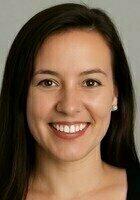Connect with hundreds of tutors like Barbara
America's #1 Tutoring Platform
Who needs tutoring?
FEATURED BY
TUTORS FROM
- YaleUniversity
- PrincetonUniversity
- StanfordUniversity
- CornellUniversity

Barbara
Bachelors, English
University of Memphis, University of Memphis
About Me
I love learning and all the wonders that accompany it. Through my years of experience, I have developed strategies to help students improve in areas of concern in order to attain their academic goals. My wish is for all of my students to love learning, too. Whether a student wants to prepare for the ACT, improve reading comprehension, or develop successful test taking strategies, I can help him or her develop the tools necessary for success.
Education & Certifications
University of Memphis
Bachelors, English
University of Memphis
Masters, Curriculum and Instruction
Q&A with Barbara
I am an educator who believes in the power of reading and writing. Not only are these skills essential to function in our day to day world but they also open a world of possibility. I believe all students can learn when given the right intellectual tools, and I enjoy the challenge of finding the right tool to unlock the potential in each student.
Connect with a tutor like Barbara
Connect with a tutor like Barbara
Tutors with Similar Experience


